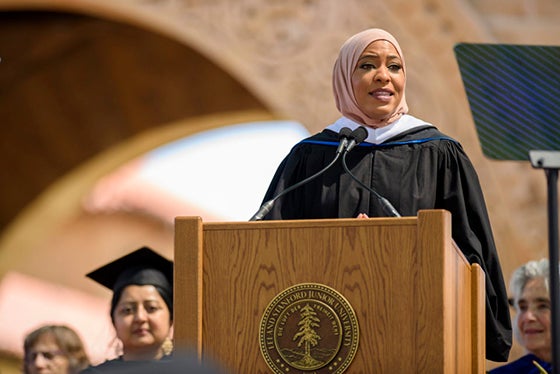Don’t allow fear to override your commitment to faith, graduates urged

See the full story and video in Stanford Report.
Amid adversity, never be afraid of what you are destined to do, said Ibtihaj Muhammad, an activist, entrepreneur and Olympic athlete, at Stanford’s Baccalaureate ceremony, a multifaith celebration for graduating students and their families and friends.
“Each time you have to choose how to deal with that reality. You have to believe in the process and never allow fear to override your commitment to faith,” said Muhammad, whose participation in the Olympics provided her a platform to give voice to marginalized communities and encourage resiliency in the face of challenges.
Organized under the auspices of the Office for Religious Life, Baccalaureate is a student-led commemoration acknowledging the spiritual rewards of education.
In her keynote address at Saturday’s event, Muhammad reflected on how she conquered what she saw as the impossible. She said that her teachers and mentors, her discipline and resilience, and the importance of her faith and community were all pivotal to her journey from a New Jersey suburb to winning an Olympic medal as a member of the U.S. fencing team, starting a business and advocating for the advancement of women and girls’ sports.
Remembering the opening ceremonies at the 2016 Olympic Games in Rio de Janeiro, when she stood shoulder to shoulder with athletes of different backgrounds, faiths and experiences representing Team USA, Muhammad said: “I realized that faith in God, the guidance of my mentors, believing in myself even when others didn’t, and my resilience and commitment to my dream, brought me to this moment. And without each of those, I would not have conquered the impossible.”
At the 2016 Olympics, Muhammad became the first Muslim to wear a hijab while competing for the United States and won a bronze medal with the women’s sabre team.
Community through faith
Muhammad said it was through her faith that she was able to expand on things in life she deemed important – such as her country, community and family.
Those beliefs carried her through every competition, Muhammad said.
“I stopped praying for a win or only praying during times of difficulties, and I started to ask Allah to allow me to represent my country, my communities and my family as well,” Muhammad said. “I asked Allah to protect me from those who didn’t want good for me and surround me instead with those who would encourage me and uplift me. I asked Allah to help me show patience even when the world was testing me.”
Away from fencing, which focuses on the individual, Muhammad has turned a spotlight on communities and the importance of breaking barriers and building bridges.
“In return I was able not only to pursue my dreams of competing at the highest level, I was able to explore my faith and broaden my entire definition of community far beyond what I had experienced.”
Muhammad graduated from Duke University with a dual major in international relations and African studies. In 2016, she was named one of Time’s 100 Most Influential People.
“Your lives can be rich and meaningful if you continue to learn, if when you fall you bounce back, and if you embrace, protect and expand your communities to include those who for too long have been considered ‘other,’” Muhammad said in closing.
“Never be afraid to do what you’re destined to do.”
Trust in something bigger
Taking the stage after Muhammad was graduating senior Edan Armas, who was selected from among 42 competitive and compelling submissions to deliver the Baccalaureate student reflection.
Armas has spent much of his undergraduate career studying how emotion manifests in the body, the mind and the collective consciousness. In his address, he talked about how he learned to cope with emotions, in particular the pains of growing up. He said the best way to cope – from a minor childhood accident to a major college breakup – was to take a few deep breaths and “trust in something bigger than it.”
“Breathe, and trust in the body that will heal,” Armas said. “Breathe, and trust in the mother who will guide you. Breathe, and trust that tomorrow will be a different day.”
While his experiences at Stanford taught him that hardship and failure were opportunities for personal growth, Armas said it also showed him that these were moments to acknowledge and appreciate the people, places and things that provided comfort during difficult times.
“Let us celebrate the moment your friend came over at 3 in the morning to be there for you while you cried and you knew you were not alone; the essays and p-sets and final projects you completed because you believed in the strength of your own work ethic; the simple sight of a jackrabbit in Meyer Green during golden hour reminding you that you are part of something so much bigger than yourself,” Armas said.
Armas will receive his bachelor’s degree in human biology with a self-titled concentration in neurophenomenology of emotion at Sunday’s Commencement.
In closing, Armas said: “I would like all of us to take a couple of deep breaths and center ourselves in something we trust in. It can be in your relationships, in the strength of your faith, or in the self all of you should be proud to be.”
